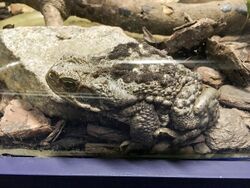Biology:Rhinella jimi
| Rhinella jimi | |
|---|---|

| |
| Scientific classification | |
| Kingdom: | Animalia |
| Phylum: | Chordata |
| Class: | Amphibia |
| Order: | Anura |
| Family: | Bufonidae |
| Genus: | Rhinella |
| Species: | R. jimi
|
| Binomial name | |
| Rhinella jimi (Stevaux, 2002)
| |
| Synonyms[3] | |
| |
Rhinella jimi is a species of toads in the family Bufonidae. It is endemic to northeastern Brazil and known between Bujaru in northeastern Pará and Maranhão in the north, south to Bahia and Vitória, Espírito Santo.[3][4] Prior to its description in 2002, it was confused with Rhinella schneideri (=Bufo/Rhinella paracnemis).[3] The specific name jimi honors Jorge Jim, a Brazilian herpetologist.[2][5] Common name Jimi's toad has been coined for it.[4]
Description
Rhinella jimi is a stout and large toad. Adult males measure on average 147 mm (5.8 in) and adult females 134 mm (5.3 in) in snout–vent length. The holotype, an adult male measures 171 mm (6.7 in). The tympanum is distinct. The head has many cranial crests. The parotoid glands follow the supra-tympanic crests. Males have moderately strong arms, while they are slim in females. The fingers have no webbing. The legs are short and robust. The toes are fringed and have basal webbing. Dorsal skin is covered by many tubercles of different sizes. Males have keratinized spines on the dorsum, flanks, and upper surfaces of limbs. Preserved specimens are grayish beige above, mottled with dark brown spots. The parotoid glands have a more orangeish tint. The ventrum is lighter beige than in dorsum. The head is very dark, from brown to nearly black.[2]
Habitat and conservation
Rhinella jimi is a very common species that inhabits secondary forests, savanna, agricultural lands, and other open areas and disturbed habitats at elevations up to 800 m (2,600 ft). Breeding takes place in permanent and temporary ponds. Although it is used for black magic, it is not facing any major threats. It is present in many protected areas.[1]
References
- ↑ 1.0 1.1 Gilda Andrade, Ana Carolina Carnaval (2004). "Rhinella jimi". IUCN Red List of Threatened Species 2004: e.T54674A11184744. doi:10.2305/IUCN.UK.2004.RLTS.T54674A11184744.en. https://www.iucnredlist.org/species/54674/11184744. Retrieved 16 November 2021.
- ↑ 2.0 2.1 2.2 Stevaux, Maria Nazaré (2002). "A new species of Bufo Laurenti (Anura, Bufonidae) from northeastern Brazil". Revista Brasileira de Zoologia 19 (Suppl. 1): 235–242. doi:10.1590/S0101-81752002000500018.
- ↑ 3.0 3.1 3.2 Frost, Darrel R. (2018). "Rhinella jimi (Stevaux, 2002)". Amphibian Species of the World: an Online Reference. Version 6.0. American Museum of Natural History. http://research.amnh.org/vz/herpetology/amphibia/Amphibia/Anura/Bufonidae/Rhinella/Rhinella-jimi. Retrieved 23 September 2018.
- ↑ 4.0 4.1 Valencia-Zuleta, A.; Maciel, N. M. (2017). "Geographic distribution: Rhinella jimi (Jimi's Toad)". Herpetological Review 48 (2): 385. https://www.dropbox.com/s/xjc99g8rsb9oeop/HR48%282%29%20Geographic%20Distribution%20381-406.pdf?dl=1.
- ↑ Beolens, Bo; Watkins, Michael; Grayson, Michael (2013). The Eponym Dictionary of Amphibians. Pelagic Publishing. p. 105. ISBN 978-1-907807-42-8. https://books.google.com/books?id=QJY3BAAAQBAJ&pg=PA105.
Wikidata ☰ Q2212209 entry
 |

